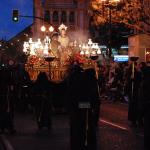If the Intellectual Dark Web (IDW) is a thing, is it possible that it has a theological equivalent? For those who haven’t heard of IDW, here‘s a brief overview:
Bari Weiss, an opinion writer and editor at the New York Times, created a stir this week with a long article on a group that calls itself the “Intellectual Dark Web.” The coinage referred to a loose collective of intellectuals and media personalities who believe they are “locked out” of mainstream media, in Weiss’s words, and who are building their own ways to communicate with readers.
The thinkers profiled included the neuroscientist and prominent atheist writer Sam Harris, the podcaster Dave Rubin, and University of Toronto psychologist and Chaos Dragon maven Jordan Peterson.
The article provoked disbelieving guffaws from critics, who pointed out that cable news talking heads like Ben Shapiro have hardly been purged. Many words could be used to describe Harris, but ”silenced” is not plausibly one of them.
Some assertions in the piece deserved the ridicule. But Weiss accurately captured a genuine perception among the people she is writing about (and, perhaps, for). They do feel isolated and marginalized, and with some justification. However, the reasons are quite different from those suggested by Weiss. She asserts that they have been marginalized because of their willingness to take on all topics and their determination not to “[parrot] what’s politically convenient.”
Most readers here will be familiar with Jordan Peterson, the current go-to source for young men who need common sense, but some may be surprised to hear he is associated with something dark. Other members in IDW were in the news a year ago, Bret Weinstein and Heather Heying (married) who taught at Evergreen State College and received an untoward reaction when they refused to go along with campus events designed to heighten racial sensitivity (which wasn’t how they saw it).
What shades IDW, according to Weiss, is its members’ refusal to comply with progressive standards in the academy and media:
Here are some things that you will hear when you sit down to dinner with the vanguard of the Intellectual Dark Web: There are fundamental biological differences between men and women. Free speech is under siege. Identity politics is a toxic ideology that is tearing American society apart. And we’re in a dangerous place if these ideas are considered “dark.”
If these are samples of IDW thought, the principles that give them a measure of coherence are these:
First, they are willing to disagree ferociously, but talk civilly, about nearly every meaningful subject: religion, abortion, immigration, the nature of consciousness. Second, in an age in which popular feelings about the way things ought to be often override facts about the way things actually are, each is determined to resist parroting what’s politically convenient. And third, some have paid for this commitment by being purged from institutions that have become increasingly hostile to unorthodox thought — and have found receptive audiences elsewhere.
At the end of her piece, Weiss contemplates whether she is herself eligible for IDW:
Like many in this group, I am a classical liberal who has run afoul of the left, often for voicing my convictions and sometimes simply by accident. This has won me praise from libertarians and conservatives. And having been attacked by the left, I know I run the risk of focusing inordinately on its excesses — and providing succor to some people whom I deeply oppose.
I get the appeal of the I.D.W. I share the belief that our institutional gatekeepers need to crack the gates open much more. I don’t, however, want to live in a culture where there are no gatekeepers at all. Given how influential this group is becoming, I can’t be alone in hoping the I.D.W. finds a way to eschew the cranks, grifters and bigots and sticks to the truth-seeking.
So what would constitute a Theological Dark Web (TDW)? It would mean first identifying the gate keepers and then discerning what topics such institutions keep off limits. For evangelicalism you could point to the folks at Christianity Today magazine and related endeavors. A more recent effort to bring evangelicalism back to a more conservative posture is The Gospel Coalition. Neither of these organizations facilitates dark or dissonant ideas and both function as gate keepers by identifying who’s in (popular and acceptable).
Then what about some of the traits among those in TDW? If you go back to the sorts of things you might hear around IDWers, you might arrive at certain theological equivalents:
There are fundamental biological differences between men and women.
There are fundamental differences between evangelicalism and Protestantism of the Reformation.
Free speech is under siege.
Having theological disagreements is mean.
Identity politics is a toxic ideology that is tearing American society apart.
Dietrich Bonhoffer and Martin Luther King, Jr. may not have been the most orthodox of theologians.
Then if you want an analogous set of principles, it might look like this:
Willingness to disagree ferociously, but talk civilly, about nearly every meaningful subject: religion, abortion, immigration, the nature of consciousness.
Willingness to disagree about baptism, the Lord’s Supper, ordination, limited atonement, small group Bible studies and small group prayer.
Determination to resist parroting what’s politically convenient.
Determination to resist what’s popular on the conference circuit.
Purged from institutions that have become increasingly hostile to unorthodox thought — and have found receptive audiences elsewhere.
Working outside moderate evangelical institutions and finding receptive audiences in Presbyterian, Lutheran, and Anglican settings.
In fact, what may identify TDW more than anything else is an identification with a communion or denomination first, with parachurch institutions functioning on the periphery.
I think it’s time for a Theological Dark Web.















